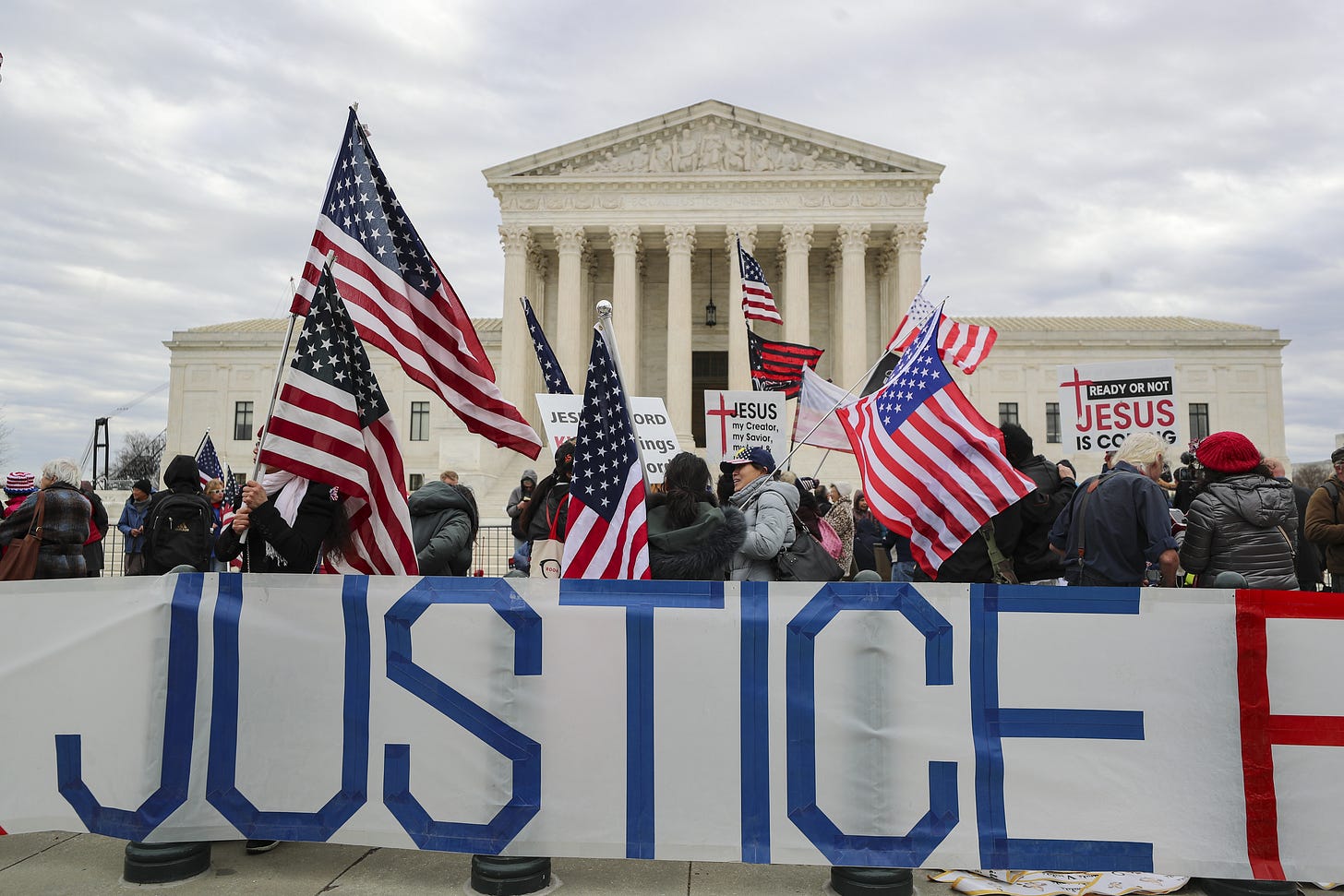Jan. 6th Prosecutions, Including Trump’s, May Be at Risk
SCOTUS may take a scythe to the statute barring obstruction of an official proceeding.

ON TUESDAY, THE SUPREME COURT heard oral argument in Fischer v. United States, an appeal of the criminal conviction of a January 6th rioter, Joseph Fischer. He is one of nearly 350 January 6th defendants who have already been convicted of or pleaded guilty to a charge of obstruction of an official proceeding under 18 U.S.C. § 1512(c). If Fischer wins a reversal, it would cascade across the January 6th prosecutions, creating a nightmare for the Justice Department and the federal judges involved—as well as a rhetorical boost for Donald Trump’s campaign.
Two of the four January 6th charges pending against Trump in the criminal case brought by Special Counsel Jack Smith rely on the very same law. Although Trump’s case is on more solid legal ground than Fischer’s, if the Supreme Court slaps down DOJ, Trump will undoubtedly cry “deep state” foul, shoring up his false and incendiary claims that the entire American system of justice is corrupt and out to get him.
The § 1512(c) obstruction statute was enacted in the wake of the Enron accounting scandal, in which accounting firm Arthur Andersen was criminally indicted and convicted of obstruction of justice for shredding documents and deleting emails (the Supreme Court later overturned the conviction based on faulty jury instructions). In 2002, Congress amended the obstruction statute as part of the Sarbanes-Oxley Act, a major post-Enron reform package. Fischer now argues that the charge against him for obstruction relating to his storming of the U.S. Capitol and assaulting a law enforcement officer should be thrown out because his actions had nothing to do with documents or records—and that’s what Congress cared about after Enron.
The relevant part of the statute contains two subsections—one relating to corruptly tampering with a document with an intent to obstruct its availability for use in an official proceeding, the other making it a crime more generally to “otherwise” obstruct, influence, or impede any official proceeding.
Fischer claims both parts must be read together, such that “otherwise” only encompasses other forms of document tampering. The government argues that the two provisions operate independently of each other—that Congress meant to broaden liability for obstruction after Enron, and that storming the Capitol in order to stop Congress from counting the Electoral College votes (certainly an official proceeding) qualifies under the second part. With one exception, all the lower federal district court judges—and all the federal courts of appeals to have considered the issue—agreed with DOJ. The Supreme Court took the case anyway, signaling that a contingent of the justices are interested in meddling in DOJ’s January 6th charging decisions.
Justice Samuel Alito is clearly one of them, going so far during Tuesday’s oral argument as to toss Fischer’s counsel (who was struggling) some arguments to bolster his case. Alito established that either interpretation of the statute is plausible. The question isn’t whether there’s a correct one, but whether one is better than the other, and Alito offered a list of reasons for siding with the January 6th defendants’ interpretation—no doubt with an eye toward persuading some of his colleagues to take his side. Chief Justice John Roberts’s questioning indicated that he’s on board with Alito. Although Justices Brett Kavanaugh, Neil Gorsuch, and Clarence Thomas were less obvious about where they are leaning, they seemed concerned that DOJ’s reading would allow someone who rang the fire alarm or shouted down a judge in open court could go to jail for twenty years under this stringent law. The other justices—including Justice Amy Coney Barrett—seemed far less persuaded that DOJ and the lower federal courts have it wrong. (And yes, you’ve read that correctly: This is another of those cases in which the justices seem, at least based on oral argument, to be dividing along male/female lines.)
Solicitor General Elizabeth Prelogar performed excellently, pointing out that DOJ’s use of the statute to charge January 6th defendants is indeed unprecedented, for good reason: January 6th was unprecedented. “They can’t vote if they can’t breathe,” she quoted Fischer as saying on that day.
Much of the argument entailed a picayune back-and-forth around the technical wording of the statute—much like the oral argument in the Fourteenth Amendment case involving the Colorado court’s ruling that Trump engaged in insurrection—and, because of the implications for democracy itself, seemed almost surreal at times. “Hang Mike Pence,” the insurrectionists shouted. Let’s not forget that he was the guy constitutionally charged with certifying the votes for Biden. Thousands of people, whom DOJ has diligently been working to track down and hold accountable for over three years now, tried to stop him. If the Court steps in to rule that what those people did cannot as a matter of law qualify as “obstruction of an official proceeding,” the rule of law is in even graver danger than we thought.



